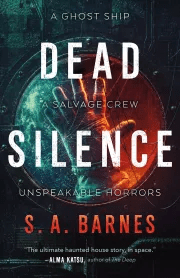Grammar Girl: What’s your favorite word and why?
S.A. Barnes: Oh, it changes all the time! At the moment, I’m loving “mercurial” and “parsimonious,” just because of how it feels to say them. My parents got me a shirt for Christmas a couple years ago that reads, “Eschew Obfuscation.” I love it.
But this reminds me of something I’d completely forgotten about. Back in high school, I used to have a dictionary in my bedroom, and I’d open it to a random page and read until I found a word or definition that I found interesting or one with story potential. It was how I first learned the word “lycanthropy.” #wordnerd
GG: What’s a word you dislike (either because it’s overused or misused) and why?
SAB: “Orientated.” The real word is “oriented.” (Though, apparently, “orientated” is acceptable in British English, per the internet.) I grit my teeth with this one all the time, as everyone is “orientating” themselves these days. “Get orientated with the new guidelines.” NOOOOOOO.
GG: What word will you always misspell?
SAB: “Rhythm.” And “rhythmic.” I can’t ever seem to get the “y” in the right place on the first try.
GG: What word (or semblance of a word) would you like to see added to the dictionary? Why?
SAB: “Consideringly.” As in, “He eyed her consideringly.” But it’s bad writing, so even if the word existed, I would still try to avoid that phrasing. And yet, I catch myself writing it into almost every terrible first draft.
Also, I believe my sister and I have a long-standing agreement that “deceptuous” should be a word because it sounds worse—more manipulative and somehow sleazier—than “deceptive.”
GG: Any grammar pet peeves we should know about?
SAB: The Oxford comma should be law as far as I’m concerned. Why is more clarity a bad thing? I was a corporate copywriter for years before writing books, and I’ve spent more time arguing for the Oxford comma in marketing copy meetings than I would care to admit.
GG: To what extent does grammar play a role in character development and voice?
SAB: Hmm. I think every character should have a unique voice, so that a reader will know who’s talking, even without the benefit of a speech tag. Who the person is should be inextricably linked to how they speak.
Some people speak more formally because of their education, background, or role, if they’re in a position of authority, for example. Others might convey personality in how they say something.
How to Get Your Characters Right (Especially When They Aren’t Like You)
In “Dead Silence,” Lourdes is the newest team member and frequently uncertain, so more of her dialogue ends in a question mark, even if it might have been a declarative statement from anyone else. Voller, our pilot, frequently peppers his speech with “colorful metaphors” (to quote “Star Trek IV”) and slang. Even if I didn’t attribute a bit of dialogue from one of them, you’d likely know who was saying it, just based on the established voice for each of them.
You may also see changes in someone’s voice connected with growth or development over the story. A character who grows more confident in their abilities over the course of the story will likely express themselves differently by the end of the story.
How to Nail Your Character Creation in 6 Steps
GG: Do you have a favorite quotation or passage from an author you’d like to share?
SAB: I’m a sucker for a good opening line in a novel. Here’s the opening line from one of my new favorite books, “Ninth House” by Leigh Bardugo:
What is that, twenty-some words, and I’m hooked. I want to know so much more! I aspire to write opening lines like this one, sentences that make readers immediately crave more.
GG: What grammar, wording, or punctuation problem did you struggle with this week?
SAB: I usually write in first person, present tense. For a project I’m working on right now, though, I think it’s going to end up being a stronger story if it’s in third. So I’m in the middle of revising/rewriting to accommodate that shift, and it’s been so long since I’ve written that way that it feels strange. It’s not just shifting the “I/my” to “she/hers” but also the different allowances that come with a slightly more distant perspective. First person is more intimate but that also makes it harder to hide things I’m not quite ready to reveal. So, I’m trying to find the line between tight third and first, where the reader feels connected to the main character but not privy to her every thought.
Also, for whatever reason, I’m comfortable with first person present tense, but I keep catching myself shifting to past tense when I write in third. At the moment, this draft is a mishmash of everything!

